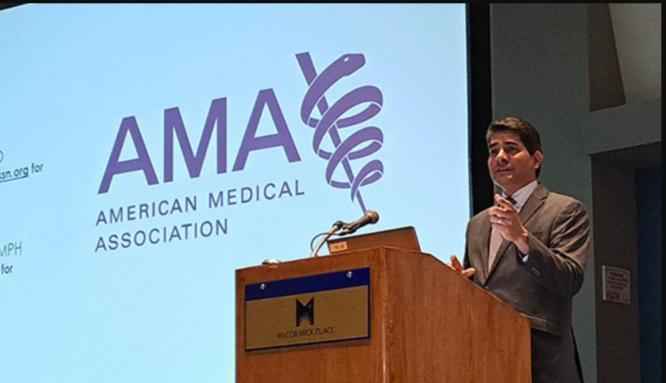Don’t simply aspire for health innovation equity ensure it 2023

The AMA also wants to incorporate augmented intelligence (AI) and other digital health tools into health care in a way that improves health equity. Bobby Mukkamala, MD, the immediate past chair of the AMA Board of Trustees, said physicians should be involved in IT product development from the start.
“We identify opportunities to integrate the perspective of practicing physicians into the development of this—hence, our presence here is huge, so that we can influence the development of your work product and help us take care of our patients,” said Flint otolaryngologist Dr. Mukkamala.
“The AMA has the unique opportunity to ensure that the evolution of AI—augmented intelligence—and digital medicine benefits patients, physicians, and the health care community,” he said. “We want ongoing engagement to improve outcomes and professional satisfaction.”
AMA and HIMSS headquarters Chicago hosted 35,000 health IT professionals for the conference. Last year’s Orlando conference drew 29,000 people.
“Today’s digital technology—from wearables to AI—offers almost unlimited potential to transform health care, but ‘potential’ is the important word when we’re talking about digital health, because we know that so few digital health tools marketed to everyday consumers—or even to physicians—live up to their claims,” Dr. Mukkamala said.
Telehealth may be a “great equalizer in medicine” by expanding access to care for historically neglected areas, he added.
“We know that this won’t happen by accident—in fact, if technology isn’t intentionally developed for that equalizer, it can backfire and serve to widen that gap,” Dr. Mukkamala added.

“We have to create that future if we’re serious about identifying and eliminating those persistent health care disparities that contribute to such poor outcomes for marginalized communities,” he said. “This work is crucial.”
Optimizing everyone’s health
Dr. Mukkamala was joined by AMA Senior Vice President and Chief Health Equity Officer Aletha Maybank, MD, MPH, who said her mission is to “facilitate a process across the entirety of the AMA that would lead to embedding equity.”
The AMA defines health equality as “optimal health for all” and promotes access, research, data collecting, and equity in care.
Dr. Maybank quoted physician researcher Camara Phyllis Jones, MD, MPH, PhD, who said, “to get to health equity, we have to first value all individuals and populations equally.”
Dr. Maybank said many would claim they regard everyone equally, but the brutal truth says otherwise.
“Our data—the data of our systems and institutions—shows that we don’t value all people equally,” she remarked. “If we did, our results would show that.”
In addition to health disparity, Dr. Maybank emphasized that entrepreneurs from historically underrepresented communities—especially women—lack financing capital.
The AMA is the principal sponsor of the In Full Health Learning and Action Community, which promotes digital solutions for historically underrepresented groups without accidentally embedding prejudice.
The AMA’s strategy plan for racial justice and health equity inspired In Full Health. HIMSS is a founding partner.

Two interrelated but separate gaps create health innovation inequity.
These include the health innovation solutions being funded, resourced, and adopted—what they focus on and how they’re designed—and who controls opportunities to drive health care innovation and who makes funding decisions and secures capital for new health care solutions.
“Who benefits from what’s being created? Who loses? Dr. Maybank. Who’s hurt? How do you minimize unforeseen consequences?
The In Full Health Learning and Action Community invites physicians, investors, solution developers, funders, and others to impact the health solution ecosystem.
